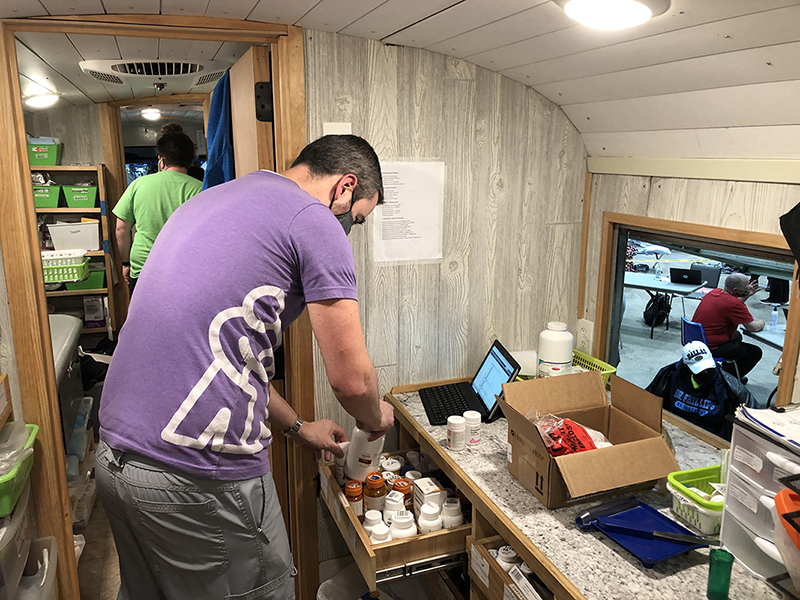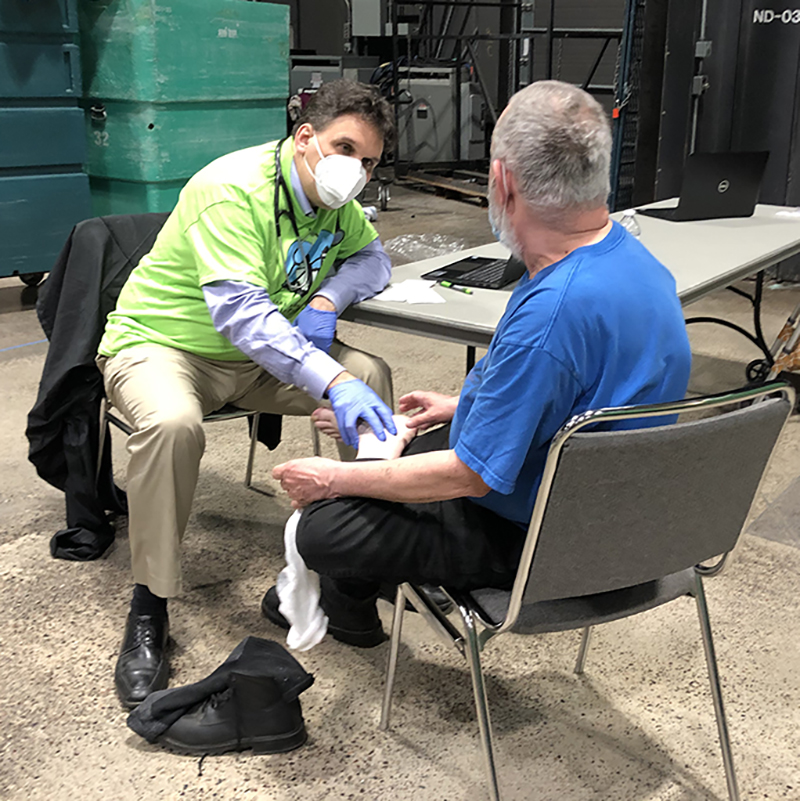Local Jewish doctor serves homeless through medical nonprofit
Dr. Jonathan Jacobs sits at a table listening to his patient describe his foot pain from plantar fasciitis. The pain was evident as the man limped up. He works on a factory line and being on his feet all day only exacerbates his condition.
Jacobs examines the man’s foot and recommends an injection of Lidocaine to temporarily relieve the pain. He then walks over to the bright green bus parked a few feet away that serves as a makeshift clinic to get the local anesthetic from the pharmacist inside.
This evening, Jacobs isn’t seeing patients in his office at Menorah Medical Center, where he works in internal medicine, or as part of his concierge medicine practice. He’s working his regular weekly volunteer shift with Care Beyond the Boulevard (CBB), a local nonprofit that operates mobile health clinics and provides medical care to the homeless, uninsured or otherwise vulnerable in and around Kansas City, Missouri.
Jacobs has been volunteering with CBB for almost four years and is one of more than 100 CBB volunteers. He is also the president of the board and the medical director.
“This group is unbelievable,” he said. “The work is unbelievable that we do.”
CBB, which celebrated its fifth anniversary last week, was started by Jaynell “KK” Assmann and her husband. A registered nurse for more than 20 years, Assmann conceived the clinic while volunteering at a local food kitchen. She realized the patrons needed healthcare as well as food.
The goal, Assmann said, is to provide compassionate healthcare to all, and particularly the “rough sleepers” who bed down outside. CBB doesn’t turn anyone away — its patients include people who have homes but no insurance and little money to afford healthcare.
CBB started with a small group of volunteers and a pickup truck equipped with a homemade pharmaceutical cabinet. A year later, they received an old school bus and the funds to renovate it into a mobile medical clinic. Assmann’s husband did the renovations.
The bus includes a small exam “room” for more private exams, a pharmacy section and a storage area for non-medical supplies, such as toothbrushes, socks, umbrellas and sleeping bags. This year, CBB added a van so volunteers could make more stops and collect more donations.
The nonprofit has a busy schedule, running seven regular clinics and routes five days a week (Monday through Thursday and on Saturdays), with an additional monthly clinic in Independence. They provide care at churches and homeless camps, and in February added a weekly stop at the temporary shelter set up in Bartle Hall, pulling the van and bus in through the back and setting up a makeshift waiting room next to the rows and rows of cots.
Going to where their patients are helps the CBB volunteers connect with them, said Assmann. New patients are often reluctant to trust the CBB workers. But after a week or two, “they would do anything for us,” Jacobs said. “They end up being very trusting, very grateful, very appreciative.”
CBB provides several different types of care: acute care for short-term medical problems; routine care, which includes check-ups and follow ups; and seasonal care like flu shots and school physicals for children. Wound care and burns from starting fires are the most common types of injuries (although CBB has treated bullet wounds before). In the past few months, the cold has meant a lot of frostbite cases.
Although the bus and van hold a lot of medical supplies, it doesn’t have everything. A common challenge is not having the specific item needed to treat a patient. When Jacobs asked for the Lidocaine to help ease his patient’s plantar fasciitis, he was told there wasn’t any on hand that night. He gave the man some painkillers and asked him to come back next week, promising he would have what he needed.
“It’s raw medicine,” Assmann said. “It’s very difficult. It’s using our senses; we don’t have labs, we don’t have X-rays…”
What CBB does have is a lot of dedicated volunteers. Most of the volunteers work full time jobs — ranging from doctors and nurses to medical residents and students, to those who hope to one day go into the medical field.
Jonah Elyachar is one such volunteer. Like Jacobs, he is Jewish.

He’s applying to medical school and has been volunteering with CBB for the past 18 months. He helps with everything from patient registration, to taking vitals, to making sure things run smoothly during the clinics. He started with CBB not only for the experience, but to help homeless people get care they wouldn’t get anywhere else.
“For me, it’s still tough every time (I volunteer) knowing there are people that have the same problems that everyone else has, they just don’t have access to the same care as everyone else,” he said.
The homeless aren’t in a position to be able to take care of themselves like they should, he said. They can’t get prescriptions; they have no running water to keep wounds clean.
“It’s hard for me to describe, because I enjoy what I’m doing, but it’s not happy,” Elyachar said. Even on slow nights, he can’t help but think there are more people out there who need CBB’s help but can’t find them or have no way to get to them.
CBB is working to meet increasing demand. In its first year, it registered 900 patient encounters. Last year, that number grew to 4,165 encounters with 1,405 patients; CBB’s goal this year is to treat more than 2,000 patients and have more than 5,000 encounters.
Currently, there are just a few full-time CBB employees, including a case worker, a program coordinator and a volunteer coordinator. Assman is leaving her nursing job to be CBB’s full-time CEO, so she can ensure the organization doesn’t get bogged down with day-to-day operations.
“We want to make sure we don’t lose focus,” she said. “The patient is always at the focus of what we do.”



